NHS workers furiously hit out against ‘blunt instrument’ plans to make Covid jabs for staff compulsory by winter, despite the vast majority of medics already immunised.
Top doctors and health service unions warned the policy could push out key staff ‘at a time we can least afford it’ and lead to discrimination.
The Government today launched a six-week consultation into plans to make vaccination a legal requirement to work with NHS patients.
Yet figures show 88 per cent of NHS staff are fully vaccinated and around 92 per cent have had a first dose, despite being first offered a jab last December.
The numbers are slightly lower in London, where there has been more hesitancy about vaccination, with only 86 per cent have had a first jab. There are about 1.2million frontline staff in the health service in England.
Under the plans, around 120,000 frontline NHS staff who are still not vaccinated could be required by law to be jabbed to reduce transmission in hospitals.
President of the hospital doctors’ union the HCSA Dr Claudia Paoloni said using the ‘blunt instrument of compulsion rather than persuasion’ will put off hesitant key workers.
The Royal College of Nursing (RCN) expressed hostility at the plans too, and raised doubts that the plans would even increase uptake.
And the NHS Confederation — which represents NHS trusts across England — said ‘the focus must remain on increasing vaccine confidence’ rather than forcing staff to take jabs.
A member of the Joint Committee for Vaccination and Immunisation (JCVI) — an independent body that advises the Government on vaccine policy — today said making jabs mandatory would feel ‘like an admission of failure’.
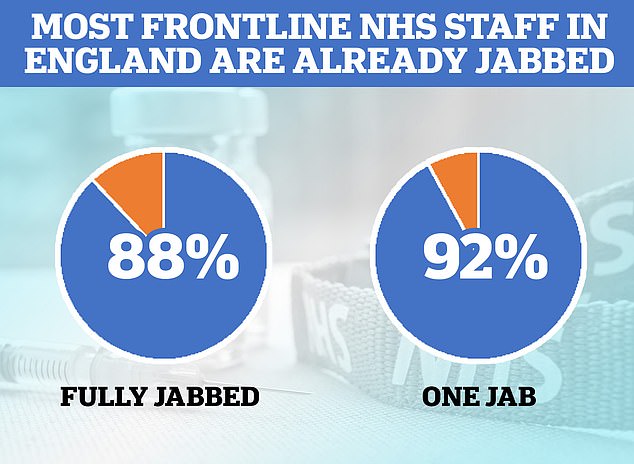
Figures show around 92 per cent of NHS trust staff have received one dose of a vaccine, with 88 per cent of staff having received both doses. The figures are lower in London, where only 86 per cent have had a first jab
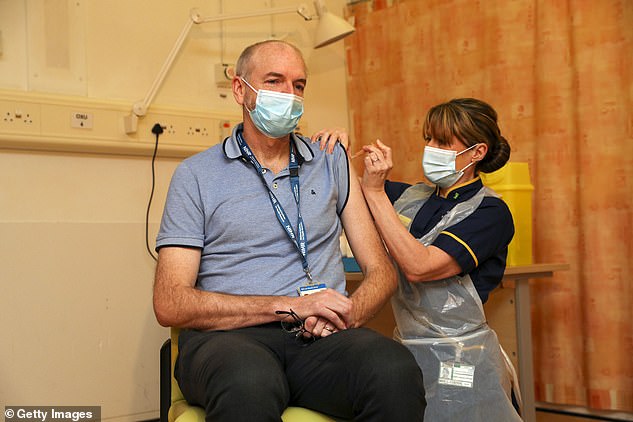
The Government today launched a six-week consultation into plans to make vaccination a legal requirement to work with NHS patients. Pictured: Professor NHS consultant Andrew Pollard, director of the Oxford Vaccine Group who helped develop the Oxford-AstraZeneca vaccine, receiving a jab in January
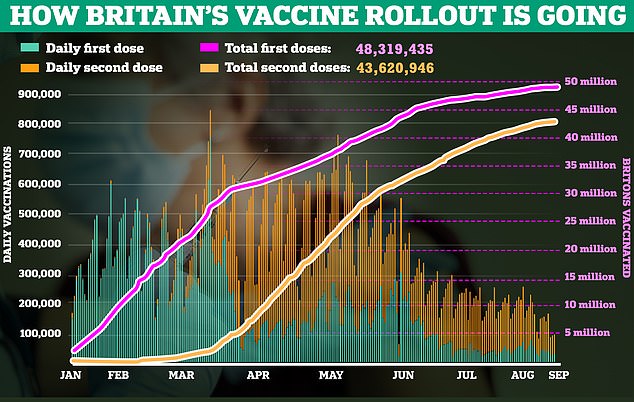
Uptake among health workers is slightly less than the national average for over-18s in England, with 88.5 per cent having taken up the offer of a first dose.
Those who refuse the jab could be barred from working with patients, meaning that they will likely be redeployed or risk losing their jobs. Social Care Minister Helen Whately today said staff who reject the vaccine could be moved back to office roles.
But NHS bosses fear it could trigger a staffing crisis, hampering efforts to tackle the enormous care backlog. They warned it could be discriminatory.
A study in the BMJ in February found rates among ethnic minority doctors and healthcare staff were significantly lower than rates among white staff.
The plans would also require NHS staff to be vaccinated against the flu, amid warnings that the UK will be hit with a bad bout this winter due to a lack of natural immunity.
It would bring the NHS in line with the care sector, where staff working in elderly care homes are required to be fully vaccinated against Covid.
Now NHS wants to hire £270k bosses: Recruitment drive fuels fears over where extra cash raised by social care reforms will be going
The NHS will hire dozens of new executives on salaries of up to £270,000 — to make sure the new £36billion health and social care tax is spent wisely.
The revelation fuelled growing fears about where the extra cash raised by Boris Johnson’s controversial reforms will be going.
Health Secretary Sajid Javid promised yesterday to be ‘watchful for any waste and wokery’ over the £12billion a year raised by a 1.25 percentage point increase in national insurance.
But critics slammed the creation of 42 chief executives of integrated care boards in England, whose job will be to ‘deliver joined-up services’ across the NHS and social care.
Online job adverts reveal each executive will be paid an average of £223,261.
Seven jobs are advertised with salaries of £270,000, which is 80 per cent more than the Prime Minister earns.
According to the job adverts, successful candidates will need to be ‘politically astute’ and ‘actively champion diversity, inclusion, and equality of opportunity for all’.
Jake Berry, head of the Northern Research Group of Tories, said: ‘Throwing other people’s money down a bottomless pit doesn’t become a good idea if you put the NHS logo next to it.’
Advertisement
The Government announced vaccinations will be compulsory for all care workers from November 11, despite warnings that tens of thousands of carers could leave the profession as a result.
And unions have hit out at plans to extend the policy to all NHS staff this winter.
HCSA boss Dr Paoloni said: ‘Our concern is that using the blunt instrument of compulsion rather than persuasion to ensure staff are vaccinated we could risk pushing out key NHS staff at a time when we can least afford it.
‘The government itself acknowledges the variance in vaccine take-up between employers ranging from 74 to 94 percent. We know that many hospitals have been extremely successful in persuading apprehensive staff to be vaccinated.
‘We encourage all NHS staff to be vaccinated but this is one part of a much bigger equation.
‘Covid vaccination rates in the NHS have been high for a large part of the pandemic, but experience shows we also need measures to limit transmission in the community, maintain tough infection control in hospitals and provide adequate levels of PPE and regular testing for staff.’
The RCN pushed back against the plans, arguing the majority of staff ‘accept the vaccine’ and the Government’s focus should be on communicating the benefits of jabs, not forcing them into people’s arms.
Helen Donovan, professional lead for public health, said: ‘All nursing staff should have any vaccine deemed necessary to help protect themselves, patients, colleagues, family members, and the wider community.
‘This has always included the flu vaccine and more recently the Covid vaccine.
‘We do, however, have concerns around mandating vaccines and whether this will ultimately improve uptake.
‘The majority of all nursing staff accept vaccination, the Department of Health and Social Care’s own figures show 92 per cent of NHS staff have had their first dose and 88 per cent both doses of the Covid vaccine.
‘The focus should be on communicating the benefits of vaccination rather than making them mandatory.
‘Involving staff in this consultation will help them to become further involved in the decision making and it is vital their views are properly taken into account over the next steps.’
The NHS Confederation argued that compulsory vaccination is unnecessary because NHS staff are ‘overwhelmingly doing the right thing’.
Matthew Taylor, the body’s chief executive, said: ‘NHS organisations have been working hard to encourage uptake of the vaccination among all eligible members of the workforce and will continue to do so, especially with members of staff in groups where uptake is lower.
‘As it stands, the vast majority of NHS staff have already chosen to be vaccinated, and the important thing is to make sure those who have yet to be vaccinated are supported to do so.
‘Members will continue to emphasise education and communication with staff, which will be crucial even if the government mandates vaccination for NHS staff.’
He continued: ‘We will also work closely with our trade union colleagues to address the concerns of their members and to ensure that the implementation of any decision is handled sensitively.
‘We will need to understand the detail of the proposals, but the focus must remain on increasing vaccine confidence and the approach taken to date to encourage uptake through informed consent remains the preferred option.’
Mrs Whately said there were people who could not have the vaccine for medical reasons but those who decline the jab could lose their frontline jobs.
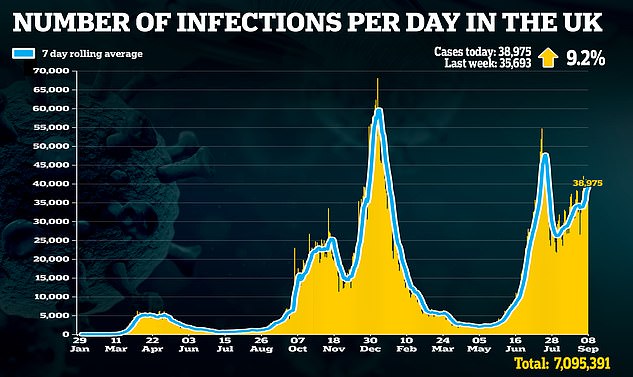
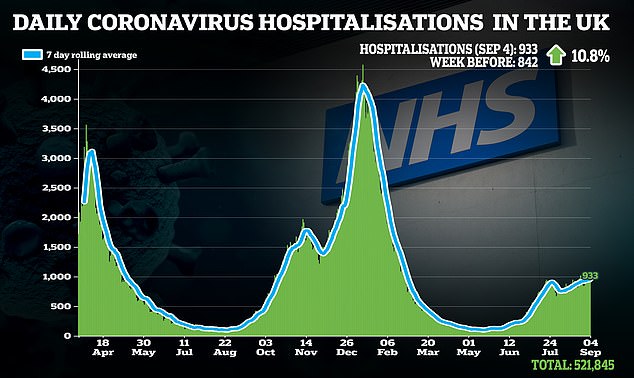
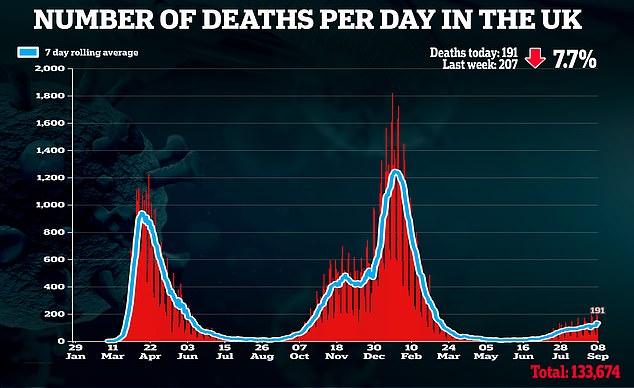
She told Times Radio: ‘You can look at whether there are alternative ways somebody could be deployed, for instance, in a role that doesn’t involve frontline work, or doesn’t involve being physically in the same setting as the patient, whether it’s, for instance, working on 111, something like that.
‘So we could look at alternative roles for individuals, these are exactly the sorts of things that we can investigate.’
But JCVI member Professor Adam Finn told BBC Radio 4’s Today programme this morning that compulsory jabbing of all NHS staff would imply messaging was not effective enough.
Professor Finn, a professor of paediatrics at the University of Bristol, said: ‘It’s a kind of an admission of failure.
‘It’s like saying you can’t either find the time or find the ability to explain to people why it makes sense and create the culture in which everybody does it because they understand why it’s important.
‘If you build a culture, it becomes the norm and everybody does it.’
But he added that he understood why it is being considered.
‘We are in a pandemic and so things sometimes get done differently,’ he said.
Will taxpayers get ANYTHING back for the NHS’s extra £10bn? Cash injection will be ‘gobbled up’ and there is NO chance of clearing waiting lists
British taxpayers were warned today that Boris Johnson’s manifesto-busting £30billion NHS handout will be ‘gobbled up’ permanently by the health service, with waiting lists and delays here to stay.
The Prime Minister promised the extra £10billion a year to clear the mammoth backlog that has amassed during the pandemic, on top of £5.4billion cash boost announced for the NHS only a couple of days ago.
But the handout has been given to the NHS without any firm targets to meet, which has raised fears the money will simply be swallowed. NHS bosses have already complained the sum isn’t enough to clear the backlog.
Under proposals, half of the £10bn a year will be spent on social care in 2023 before the full amount is devoted to the care sector in 2025 and, in theory, the NHS reverts to its normal budget.
Critics have raised doubts about the plan, claiming that if the NHS goes on a recruitment spree to plug staffing gaps then a higher budget will become ‘baked into the system’.
Announcing the tax hike yesterday, Mr Johnson said the cash would go towards nine million more checks, scans and procedures by the end of 2025, as part of the ‘biggest catch-up programme in the NHS’s history’.
He promised to boost NHS capacity for routine operations by 30 per cent compared to pre-pandemic levels, hire 50,000 more nurses and open new surgical hubs to deliver extra operations and other procedures.
By 2025, around 40 per cent of all of day-to-day Government spending will go to the the Department of Health and Social Care, which funds the health service, according to the Resolution Foundation.
The conservative think-tank, the Institute for Economic Affairs (IEA), warned the cash boost will almost entirely be spent on hiring new staff and increasing wages, which will be hard to recoup after 2025.
Julian Jessop, an economics fellow at the IEA, said: ‘There is a risk that a temporary increase in spending on the NHS, to fix a temporary problem, becomes baked into the system, particularly via higher pay.
‘Without fundamental reform, the NHS is black hole which will swallow any money spent on it, leaving nothing extra for social care.’
The left-wing Institute for Public Policy Research (IPPR) said the funding is ‘nothing like enough to get through the backlog’, with the NHS alone needing £15billion per year to address the waiting list.
NHS England was already 38,952 nurses short at the end of June and it is not clear how quickly surgical hubs could take to set up or how they will be staffed.
A record 5.5million people were on the waiting list for routine operations and treatments — such as hip and knee replacements — at the end of June and with data for July due out tomorrow, that figure is expected to further soar.
Advertisement
The six-week consultation process will take views on whether vaccine requirements should apply for health and wider social care workers — those in contact with patients and people receiving care.
It would mean only those who are fully vaccinated, unless medically exempt, could be deployed to deliver health and care services.
The Government previously said all staff in registered care homes in England must be vaccinated against Covid from November 11, unless medically exempt.
A government source told The Times: ‘It’s only right that those who are caring for people who are particularly vulnerable to coronavirus should be vaccinated. This will save lives.’ They added that Boris Johnson had personally backed the plan for mandatory vaccination for NHS workers.
Vaccines minister Nadhim Zahawi said on Sunday the move was ‘right and responsible’ as NHS staff looking after vulnerable patients have a ‘duty of care’ to get inoculated.
But Chaand Nagpaul, chair of the Council of the British Medical Association, said in June that ‘compulsion is a blunt instrument’ and that implementing a blanket rule would ‘raise new ethical and legal implications’.
The Scientific Advisory Group for Emergencies (SAGE) Social Care Working Group has already advised the overlap between the sectors makes a strong scientific case for there to be similar approaches to vaccination.
The Department of Health and Social Care (DHSC) said the consultation would focus on the proposals, their scope, and any potential impact mandating vaccines could have on staffing and safety such as reducing staff sickness absence.
The process will also seek views on whether flu vaccines should be a requirement for health and care workers.
Findings will then help inform decision-making around how the mandate could be implemented and who could be exempt.
Staff, healthcare providers, stakeholders, patients and their families are being urged to take part, with a final decision expected this winter.
According to the DHSC, around 92 per cent of NHS trust staff have received one dose of a Covid vaccine, with 88 per cent of staff having received both doses.
However, the DHSC says new data shows uptake rates between NHS trusts can vary from around 78 per cent to 94 per cent for both doses.
National flu vaccination rates in the health service have increased from 14 per cent in 2002 to 76 per cent last year.
But in some settings, rates are as low as 53 per cent.
Health Secretary Sajid Javid urged all health and social care staff to be vaccinated, regardless of the outcome of the consultation.
He said: ‘Many patients being treated in hospitals and other clinical settings are most at risk of suffering serious consequences of Covid, and we must do what we can to protect them.
‘It’s so clear to see the impact vaccines have against respiratory viruses which can be fatal to the vulnerable, and that’s why we’re exploring mandatory vaccines for both Covid and flu.
‘We will consider the responses to the consultation carefully but, whatever happens, I urge the small minority of NHS staff who have not yet been jabbed to consider getting vaccinated — for their own health as well as those around them.’
The care industry has previously expressed concern over the effect mandatory vaccination may have on the sector’s already-stretched staffing levels.
Last month, the Institute of Health and Social Care Management (IHSCM) surveyed more than 1,000 care managers in partnership with the PA news agency.
The survey found that nine in 10 managers said their workplace was experiencing staff shortages or having difficulty recruiting.
A third of managers (32.8 per cent) said they had staff quit or hand in their notice over the requirement to be vaccinated, while more than half (55.2 per cent) said they feared they would have to dismiss staff over the coming months because they had not been vaccinated.
Source link : https://www.dailymail.co.uk/news/article-9972481/Consultation-launched-mandatory-vaccination-health-care-staff.html











